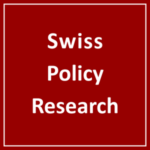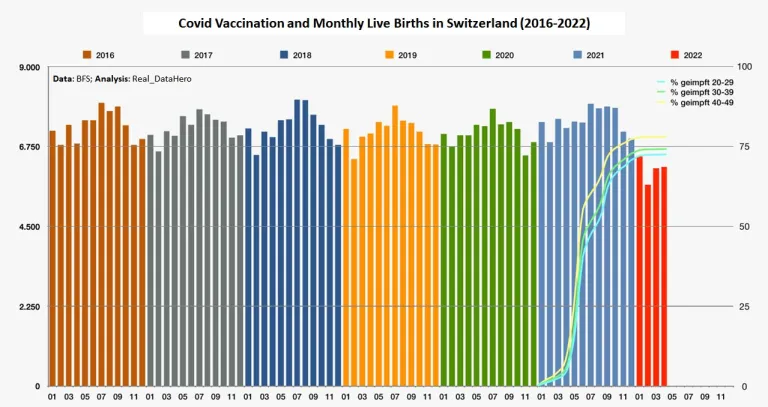Covid Vaccines and Fertility
DEBATES ON COVID - VACCINES, 27 Jun 2022
Swiss Policy Research - TRANSCEND Media Service
Why is there a substantial decrease in births in Germany and Switzerland – nine months after the beginning of covid mass vaccinations?
Jun 2022 – An Israeli study recently published in the scientific journal Andrology found a 15% decrease in sperm concentration three months after mRNA covid vaccination. The authors argued the decrease was temporary, but the data didn’t actually show a recovery, just a wider confidence interval. However, the study was very small (just 37 participants), it had no control group (to exclude external effects), and several other studies found no such decrease in sperm concentration – some even found a supposed increase, highlighting that such measurements can be quite complex.
Thus, contrary to claims by some covid vaccine skeptics, the recent Israeli study didn’t prove that covid mRNA vaccination reduces sperm concentration or quality. In fact, there is currently no strong evidence showing such an effect. On the other hand, a covid infection may temporarily impact sperm quality, but this is not unexpected after any infection or disease.
That being said, new birth data out of Germany and Switzerland raises some serious questions. Specifically, both countries recorded a consistent 10% to 15% decrease (compared to expectations) in monthly births from January to March/April 2022 (the latest available data) – that is, precisely nine months after the beginning of covid mass vaccination in the general population in April/May 2021 (see charts above and below).
How can this substantial decrease be explained? Is it due to social or biological factors?
The German winter lockdown ended only in May 2021, whereas the much softer Swiss lockdown ended already in early March 2021. Data from Britain and from New York had already shown that during the first lockdowns in early 2020, 10% to 20% fewer babies were being conceived. Thus, it is possible that the decrease in German and Swiss birth rates is a direct or indirect result of lockdowns, although the time frames do not entirely match (no decrease in late 2021, nor in late 2020).
In terms of biological factors, Germany and Switzerland both had two covid delta waves in summer and early winter of 2021 that may have influenced live birth rates (e.g. by increasing miscarriages), although the decrease in births is really only visible since January 2022. Recent birth data from other countries, including Britain and the US, does not seem to be publicly available yet.
What about covid vaccinations? Covid vaccinations could influence fertility and conception, miscarriages (prior to week 20, normally affecting 10% to 20% of all pregnancies) and/or stillbirths (after week 20, normally affecting about 0.5% of all pregnancies). Previous studies argued that covid vaccination had no impact on stillbirths, but independent reanalysis showed that the data does in fact indicate a 30% increase in stillbirths.
Furthermore, there have been widespread and officially acknowledged reports of post-vaccination menstrual disorders (over 30,000 reports in Britain alone); official reports of vaccine adverse events including death in breastfeeding babies (over 60 reported cases in Germany alone); a still unexplained, transient increase in neonatal deaths in countries like Scotland; and reports by Austrian midwives of an increase in irregularities during pregnancy and delivery after covid vaccination. Meanwhile, Pfizer has never even finished its vaccine trial in pregnant women.
Covid vaccines could impact conception and pregnancy in direct ways (e.g. via ovaries or sperm cells) or in indirect ways (e.g. via immunological, hormonal or vascular factors, including (micro) blood clots). An official Japanese biodistribution study showed that non-trivial amounts of Pfizer mRNA vaccine lipid nanoparticles do indeed end up in the ovaries, but there is currently no evidence that this impacts ovarian follicular function in a negative way.
In conclusion, data from both Germany and Switzerland does show a substantial 10% to 15% monthly decrease in live births from January 2022 to at least April 2022. This decrease could be due to lockdown effects or biological effects, including covid infections or covid vaccinations that began nine months earlier.
Health authorities and researchers should urgently investigate the true cause or causes of this phenomenon based on data from additional countries with and without lockdowns as well as with and without mRNA-nanolipid vaccines.
Meanwhile, the director of the Danish National Health Authority recently acknowledged that vaccinating children against covid was “a mistake” and that they “wouldn’t do it again”.
Figures
Switzerland: Covid vaccination and monthly live births (2016-2022)

Germany: Monthly live births, 2016-2022

Germany: Monthly birth rate (2010-2022), expectation (red) and actual (blue)

See also
- Overview: Covid vaccine adverse events (18+)
- Videos: Vaccines: Successes and Controversies
- How effective are covid vaccines, really?
__________________________________________
 Swiss Policy Research, founded in 2016, is an independent, nonpartisan and nonprofit research group investigating geopolitical propaganda in Swiss and international media. SPR is composed of independent academics that for personal and professional reasons prefer to protect their identities, and receives no external funding; there are no financial sponsors or backers. Our articles have been published or shared by numerous independent media outlets and journalists, among them Julian Assange, and have been translated into more than two dozen languages.
Swiss Policy Research, founded in 2016, is an independent, nonpartisan and nonprofit research group investigating geopolitical propaganda in Swiss and international media. SPR is composed of independent academics that for personal and professional reasons prefer to protect their identities, and receives no external funding; there are no financial sponsors or backers. Our articles have been published or shared by numerous independent media outlets and journalists, among them Julian Assange, and have been translated into more than two dozen languages.
Tags: COVID-19, Europe, Germany, Switzerland, Vaccines
DISCLAIMER: The statements, views and opinions expressed in pieces republished here are solely those of the authors and do not necessarily represent those of TMS. In accordance with title 17 U.S.C. section 107, this material is distributed without profit to those who have expressed a prior interest in receiving the included information for research and educational purposes. TMS has no affiliation whatsoever with the originator of this article nor is TMS endorsed or sponsored by the originator. “GO TO ORIGINAL” links are provided as a convenience to our readers and allow for verification of authenticity. However, as originating pages are often updated by their originating host sites, the versions posted may not match the versions our readers view when clicking the “GO TO ORIGINAL” links. This site contains copyrighted material the use of which has not always been specifically authorized by the copyright owner. We are making such material available in our efforts to advance understanding of environmental, political, human rights, economic, democracy, scientific, and social justice issues, etc. We believe this constitutes a ‘fair use’ of any such copyrighted material as provided for in section 107 of the US Copyright Law. In accordance with Title 17 U.S.C. Section 107, the material on this site is distributed without profit to those who have expressed a prior interest in receiving the included information for research and educational purposes. For more information go to: http://www.law.cornell.edu/uscode/17/107.shtml. If you wish to use copyrighted material from this site for purposes of your own that go beyond ‘fair use’, you must obtain permission from the copyright owner.
One Response to “Covid Vaccines and Fertility”
Read more
Click here to go to the current weekly digest or pick another article:
DEBATES ON COVID - VACCINES:

Maybe people just do not want to have children during a pandemic?